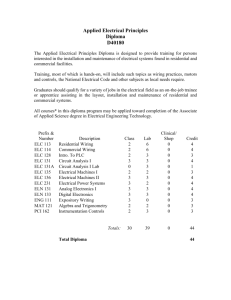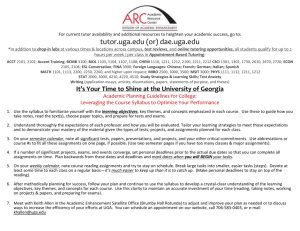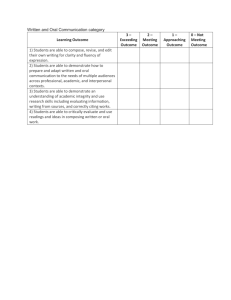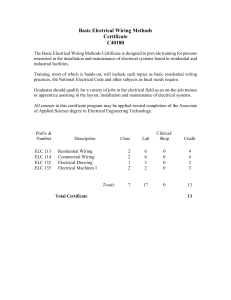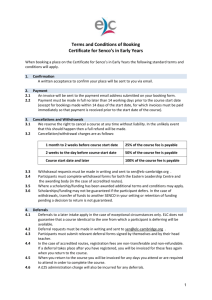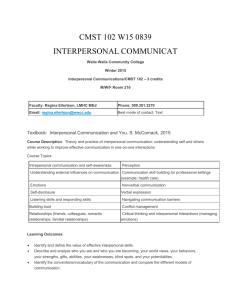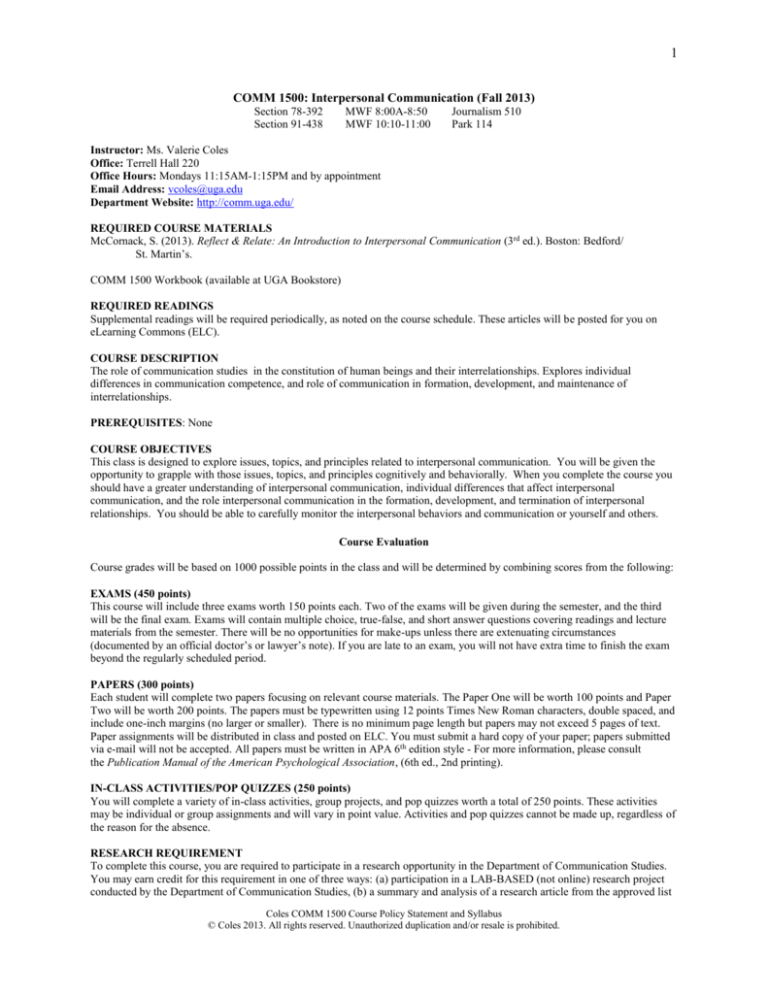
1
COMM 1500: Interpersonal Communication (Fall 2013)
Section 78-392
Section 91-438
MWF 8:00A-8:50
MWF 10:10-11:00
Journalism 510
Park 114
Instructor: Ms. Valerie Coles
Office: Terrell Hall 220
Office Hours: Mondays 11:15AM-1:15PM and by appointment
Email Address: vcoles@uga.edu
Department Website: http://comm.uga.edu/
REQUIRED COURSE MATERIALS
McCornack, S. (2013). Reflect & Relate: An Introduction to Interpersonal Communication (3rd ed.). Boston: Bedford/
St. Martin’s.
COMM 1500 Workbook (available at UGA Bookstore)
REQUIRED READINGS
Supplemental readings will be required periodically, as noted on the course schedule. These articles will be posted for you on
eLearning Commons (ELC).
COURSE DESCRIPTION
The role of communication studies in the constitution of human beings and their interrelationships. Explores individual
differences in communication competence, and role of communication in formation, development, and maintenance of
interrelationships.
PREREQUISITES: None
COURSE OBJECTIVES
This class is designed to explore issues, topics, and principles related to interpersonal communication. You will be given the
opportunity to grapple with those issues, topics, and principles cognitively and behaviorally. When you complete the course you
should have a greater understanding of interpersonal communication, individual differences that affect interpersonal
communication, and the role interpersonal communication in the formation, development, and termination of interpersonal
relationships. You should be able to carefully monitor the interpersonal behaviors and communication or yourself and others.
Course Evaluation
Course grades will be based on 1000 possible points in the class and will be determined by combining scores from the following:
EXAMS (450 points)
This course will include three exams worth 150 points each. Two of the exams will be given during the semester, and the third
will be the final exam. Exams will contain multiple choice, true-false, and short answer questions covering readings and lecture
materials from the semester. There will be no opportunities for make-ups unless there are extenuating circumstances
(documented by an official doctor’s or lawyer’s note). If you are late to an exam, you will not have extra time to finish the exam
beyond the regularly scheduled period.
PAPERS (300 points)
Each student will complete two papers focusing on relevant course materials. The Paper One will be worth 100 points and Paper
Two will be worth 200 points. The papers must be typewritten using 12 points Times New Roman characters, double spaced, and
include one-inch margins (no larger or smaller). There is no minimum page length but papers may not exceed 5 pages of text.
Paper assignments will be distributed in class and posted on ELC. You must submit a hard copy of your paper; papers submitted
via e-mail will not be accepted. All papers must be written in APA 6th edition style - For more information, please consult
the Publication Manual of the American Psychological Association, (6th ed., 2nd printing).
IN-CLASS ACTIVITIES/POP QUIZZES (250 points)
You will complete a variety of in-class activities, group projects, and pop quizzes worth a total of 250 points. These activities
may be individual or group assignments and will vary in point value. Activities and pop quizzes cannot be made up, regardless of
the reason for the absence.
RESEARCH REQUIREMENT
To complete this course, you are required to participate in a research opportunity in the Department of Communication Studies.
You may earn credit for this requirement in one of three ways: (a) participation in a LAB-BASED (not online) research project
conducted by the Department of Communication Studies, (b) a summary and analysis of a research article from the approved list
Coles COMM 1500 Course Policy Statement and Syllabus
© Coles 2013. All rights reserved. Unauthorized duplication and/or resale is prohibited.
2
of Communication journals, or (c) attendance at and a written analysis of a colloquium presentation in the Department of
Communication Studies. Failure to fulfill this requirement will result in a grade of Incomplete (I) for this course.
Note: You will need to complete a separate lab-based (not online) research project or paper for each Communication Studies
class that requires or offers research participation..Please see COMM 1500 Workbook for additional information.
Final grades will reflect the following distribution:
A = 930-1000
C+ = 770-799
A- = 900-929
C = 730-769
B+ = 870-899
C- = 700-729
B = 830-869
D = 600-699
B- = 800-829
F = 0-599
Notes about Grades:
Your final grade is final. Applying subjective standards after the fact in order to bolster your grade is unfair to your
classmates, and therefore will not occur. Adjustments will only be made in the event of a clerical error.
You must earn a C or above for this course to count toward a major in Communication Studies.
Points are earned in this class (e.g., everyone begins with zero and accumulates points based on assignments and
exams; points are not “deducted” for assignments, as in “how did I lose points on this paper?” or “why didn’t I get full
credit for this assignment?”).
NO EXTRA CREDIT IS ALLOWED IN THE BASIC COURSE
Below is a typical grade range distribution for 1500 sections:
o A – 30%
o B – 40%
o C – 25%
o D or below (including Ws and WFs) – 5%
Course and University Policies
REGISTRATION
Only students who are officially enrolled in the class may attend.
ATTENDANCE
The attendance policy for this course is as follows: Attendance figures into your grade both indirectly and directly. It figures into
your grade indirectly in that if you miss a class you may miss either a quiz or an activity. Activity points and quiz points cannot
be made up unless you missed class while acting as an official representative of the University of Georgia at some University
sanctioned event. Attendance figures directly into your grade if your number of absences exceeds the number of absences
allowed in the course (4). You lose 15 points (1.5%) of your final grade for every absence after the fourth absence.
Each student is expected to come to class ready to participate. I strongly advise you to attend all classes; Please note: students
who miss more than one or two classes and/or are regularly late to class do not tend to do well.
Please note that if you should miss class, it is your responsibility to obtain missed materials from a classmate, not the instructor.
Tardiness is not appropriate and will not be tolerated. Ensure that you allow yourself enough time to be in class before it begins.
Additionally, leaving class early is strongly discouraged.
ELC
You will be required to use ELC (www.elc.uga.edu/) in this course. Students should familiarize themselves with ELC (ELC has
an extensive online help section). If you have a problem, you may contact the helpdesk for information concerning ELC (23106). You are responsible for learning to use ELC – pleas of ignorance will not be accepted.
COMPLETED WORK/DEADLINES
Written work in the form of papers or activities completed outside of class is due on the date specified. Late work will not be
accepted. Unless otherwise specified, papers and/or assignments submitted electronically will not be accepted – no exceptions. If
you cannot be in class when an assignment is due, give it to a classmate to turn in, or turn it into the department administrative
assistant (Terrell Hall 110) no later than the end of our normal class time. The assignment must be time-stamped. Failure to turn
in assignments on time will result in a zero on the assignment. You should save all typewritten work to a disk or hard drive to
which you will have access for the entire semester. All activities and/or papers that exceed more than one page in length must be
stapled together by you before being submitted.
Coles COMM 1500 Course Policy Statement and Syllabus
© Coles 2013. All rights reserved. Unauthorized duplication and/or resale is prohibited.
3
ACADEMIC HONESTY
As a University of Georgia student, you have agreed to abide by the University’s academic honesty policy, “A Culture of
Honesty,” and the Student Honor Code. All academic work must meet the standards described in “A Culture of Honesty” found
at: www.uga.edu/honesty. Lack of knowledge of the academic honesty policy is not a reasonable explanation for a violation.
Questions related to course assignments and the academic honesty policy should be directed to the instructor. The link to more
detailed information about academic honesty can be found at: http://www.uga.edu/ovpi/honesty/acadhon.htm. All completed in
a manner that is consistent with the Code of Student Conduct and the publication A Culture of Honesty. Cases of suspected
academic dishonesty will be pursued to the fullest extent allowed by University policies and procedures. Adding another
student’s name to an attendance roster when he or she is not in class is academic dishonesty.
PREVENTABLE CATASTROPHES
Life is full of unexpected catastrophes. Some of these are controllable, whereas others are not. For those catastrophes that could
have been prevented with careful attention (such as lost notes or disks, oversleeping, etc.), you will not qualify for extended
deadlines or revised evaluations. Back up your work on your computer, hold onto your notes, and invest in a reliable alarm clock.
If an emergency arises that is out of your control, you should notify me as soon as possible.
EXAMS
Three exams are scheduled on the syllabus. Students are expected to take the exams on the dates assigned. Students are expected
to take the exams on the dates assigned. Make up exams are rarely given and never for personal reasons (e.g., work, family
events, airline ticket reservations, vacation plans, court appearances, etc.). If you will miss an exam date you should notify me as
soon as you know it will be missed. The more advance notice I receive, along with a valid explanation for missing, the greater
the probability of you being offered some accommodation. Make up exams are allowed for full credit for excused absences with
proper documentation for one of two reasons:
a) Absence due to a university sanctioned activity as an official representative of the University of Georgia where prior
notice has been provided to Ms. Coles.
b) Absence due to an emergency which has been documented through their advisor or Student Affairs or an illness which
has been verified in writing from your private physician. The note does not have to indicate the specifics of your
illness, but that the physician or clinician does not think you are well enough to attend class. Ms. Coles determines if
the circumstances are extenuating in accordance with college and university policies. If you are late to an exam, you
will not have extra time to finish the exam beyond the regularly scheduled period.
Note: Exams will not be moved to accommodate personal travel plans. If you plan to travel for vacation or any special
date or occasion, then make flight or departure arrangements that will give you ample time to travel to some airport or
other departure location.
THE 24-HOUR RULE
I enforce a “24/7 rule” when it comes to grade appeals. There is a 24 hour rule in effect for all papers and tests: you may not
contact me regarding the grade you earned until at least 24 hours after the assignment is returned. Additionally, if you would like
to speak with me regarding a grade earned, you must contact me within 7 days of the assignment being returned to you.
After a week has passed I will not be willing to discuss past assignments.
GRIEVANCE PROCEDURE
Occasionally, students are unsatisfied with some dimension of the course. If you have a concern at any time during the course,
please come speak with me directly either during office hours, by appointment, or via email.
If you want to appeal a grade, the department policy is that you must make the grade appeal in writing to me. It is my policy that
I will not discuss grade appeals via email or in class. Prepare and submit a typed argument indicating what your specific appeal
is, what grade you believe you deserved, and a justification for that grade. You must have a legitimate argument for the grade
change. Turn in the appeal before or after class, during office hours, or at a scheduled appointment within one week of the grade
being returned. If the appeal is accepted, I will re-grade the paper. Upon re-grading, I reserve the right to deduct additional points
from the grade for mistakes that had been previously undetected. Grade appeals must be submitted within two weeks of receiving
the grade. If you employ these measures and are still unsatisfied, you can contact the COMM 1500 course coordinator, Dr.
Jennifer Monahan (jmonahan@uga.edu) with a written grade appeal.
Coles COMM 1500 Course Policy Statement and Syllabus
© Coles 2013. All rights reserved. Unauthorized duplication and/or resale is prohibited.
4
REASONABLE ACCOMODATIONS
Students with learning disabilities who may require accommodations should contact The Learning Disabilities Center at 706-5427034. Reasonable accommodations will be determined on a case-by-case basis according to each student’s individual
documentation.
STUDENT CONDUCT AND EXPECTATIONS OF STUDENTS
It is expected that students will be considerate of the instructor and fellow classmates and act in a professional manner. Once
class begins, students should stop talking, working on other class assignments, etc. Cell phones, PDAs, etc. should be turned off
and no student should be talking or “texting” on cell phones during class.
Students are responsible for knowing all information contained in the course syllabus and announced during class. Not knowing
is not an excuse for late work, missed assignments, etc. This means re-reading the syllabus frequently, checking your UGA and
ELC e-mail, and asking other students in the class about any missed information.
CONTACTING THE INSTRUCTOR
The best way to get in touch with me is through UGA e-mail. I will not respond to ELC mail. You must allow 48 full business
hours for me to respond. You should only use your UGA e-mail account to contact me (not gmail, yahoo, etc.).
INTELLECTUAL PROPERTY – POSTING AND DISTRIBUTING COURSE MATERIALS
The information presented here within is intellectual property of the instructor and the University of Georgia. Thus, notes in the
form of Power Point slides, handouts, quizzes, study guides, and exams that are given to or shared in class to students via
classroom or ELC cannot be duplicated, published, and/or posted outside of the use for the particular course in any form, which
also includes the creation of Google documents or full or partial posting of missed lecture notes on ELC or websites (e.g.,
Koofers).
Tentative Course Schedule
The course syllabus is a general plan for the course; deviations announced to the class by the instructor may be necessary. Exam
dates will not change. Topics considered on any given day may change if we fall behind are or ahead of schedule. Readings
should be completed prior to class on the date for which the reading is listed.
Week
1
2
Day
8/12
8/14-8/16
8/19
8/21-8/23
3
4
8/26-8/30
9/2-9/6
5
6
9/9-9/13
9/16
9/18-9/21
9/23-9/27
9/30-10.4
7
8
10
10/7-10/9
10/11
10/14-10/16
11
10/18
10/21-10/25
9
12
13
14
10/28-10/30
11/1
11/4-11/8
11/11-11/13
11/15
Topics
Course Introduction - Why Study IPC?
Introducing Interpersonal Communication
Introducing Interpersonal Communication (cont’d)
Differing Perspectives on Interpersonal Communication
Paper 1 Assigned
Communication and The Self
Communication and Perception
PAPER 1 DUE 9/6
Communication, Culture, and Identity
EXAM 1
Code Systems: Verbal Codes and Communication
Code Systems: Nonverbal Codes and Communication
EVT Project Presentation Day
Listening and Communication
Emotions and Communication
Paper 2 Assigned
Paper 2 Workshop
Paper 2 Workshop/Exam Review
Exam 2
Conflict in Interpersonal Relationships
PAPER 2 DUE 10/25
Relational Communication: Romantic Partners
NO CLASS – FALL BREAK
Relational Communication: Family
Relational Communication: Friends
Relational Communication: Workplace
Readings
Syllabus
Ch. 1
Ch. 1
Miller article (posted on ELC)
Ch. 2
Ch. 3
No New Readings
Ch. 6
Ch. 7
No New Readings
Ch. 5
Ch. 4
No New Readings
Ch. 8
Ch. 9
Ch. 10
Ch. 11
Ch. 12
Coles COMM 1500 Course Policy Statement and Syllabus
© Coles 2013. All rights reserved. Unauthorized duplication and/or resale is prohibited.
5
15
16
17
11/18-11/20
11/22
11/25-11/28
12/2-12/3
12/4
Deception and Detecting Deception
Love Styles
NO CLASS – THANKSGIVING BREAK
Communication and Technology (*12/3 is a FRIDAY schedule*)
NO CLASS – READING DAY
No New Readings
Hendrick - (posted on ELC)
No New Readings
Section 78-392
MWF 8:00A-8:50 Journalism 510
FINAL EXAM, FRIDAY, DECEMBER 6TH 9:00 AM – 11:00 AM
BRING A #2 PENCIL, NONE WILL BE PROVIDED
Section 91-438
MWF 10:10-11:00 Park 114
FINAL EXAM, MONDAY, DECEMBER 9TH 9:00 AM – 11:00 AM
BRING A #2 PENCIL, NONE WILL BE PROVIDED
Coles COMM 1500 Course Policy Statement and Syllabus
© Coles 2013. All rights reserved. Unauthorized duplication and/or resale is prohibited.


